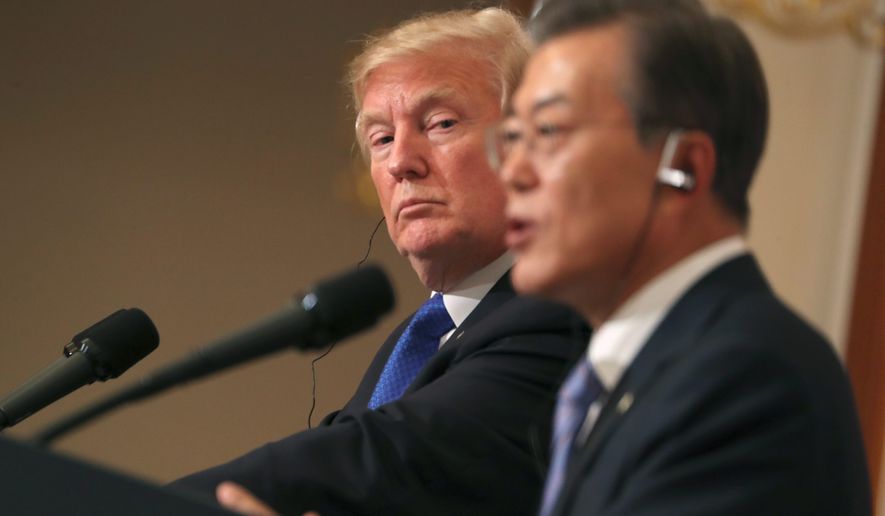On the highest-stakes stop of his Asia tour, President Trump visited China for the first time Wednesday as he seeks communist Beijing’s cooperation to control nuclear North Korea and to slash the “embarrassing” U.S. trade deficit.
Mr. Trump arrived in Beijing to deal with a Chinese president, Xi Jinping, who is at the height of his power. The Communist Party Congress gave Mr. Xi another five-year term two weeks ago and didn’t name a successor.
High on the two leaders’ agenda is how to control the North Korean regime of Kim Jong-un, which tested a nuclear weapon in September and has conducted at least 15 missile launches this year in violation of U.N. resolutions.
Mr. Trump is expected to try to persuade Mr. Xi to pressure North Korea more with steps such as limits on oil exports, coal imports and financial transactions.
“President Xi … has been very helpful. We’ll find out how helpful soon,” Mr. Trump said during a visit in South Korea.
After Mr. Trump’s arrival in China, he toured the sprawling Forbidden City compound in the heart of Beijing. The 15th-century complex was the imperial palace for several dynasties.
SEE ALSO: Donald Trump greeted at Beijing airport by soldiers, jumping children
Mr. Trump and first lady Melania Trump, Mr. Xi and his wife, Madame Peng, walked through the Gate of Supreme Harmony and toured a vast courtyard. They also received a tour of a museum where centuries-old artifacts are being restored.
Mr. Xi then hosted the Trumps for a performance of Chinese opera and a private dinner.
During his stop in Seoul, Mr. Trump toned down his “fire and fury” rhetoric about Pyongyang, saying he sees hope for North Korea to come back to the negotiating table.
“I really believe it makes sense for North Korea to come to the table and make a deal that’s good for the people of North Korea,” Mr. Trump said at a news conference with South Korean President Moon Jae-in.
He added, “I do see some movement,” but declined to elaborate.
But in an address to South Korea’s national assembly Wednesday morning, Mr. Trump said he wants peace through strength, and he warned North Korea: “Do not underestimate us.”
“And do not try us,” Mr. Trump said. “We will defend our common security, our shared prosperity and our sacred liberty. We will not allow American cities to be threatened with destruction. We will not be intimidated. And we will not let the worst atrocities in history be repeated here, on this ground we fought and died to secure.”
In 2009 North Korea walked out of six-party talks involving China, the U.S., North and South Korea, Japan and Russia. A year later, Pyongyang revealed a vast new uranium enrichment facility.
The president has had some success in persuading Mr. Xi to exert more pressure on North Korea, with China supporting U.N. sanctions against Pyongyang earlier this year. Mr. Trump believes he established a personal bond with the Chinese leader when he hosted Mr. Xi at the president’s Mar-a-Lago resort in Florida last winter.
While Mr. Trump has worked to build a rapport with Mr. Xi, he still faces considerable hurdles on the official state visit. Mr. Trump regularly accused China of unfair trade practices during the 2016 campaign, and could lack leverage to reduce China’s $347 billion trade surplus with the U.S.
With Mr. Xi’s consolidation of power, Beijing “may be more resistant to Washington’s pressure,” said Peter Brookes, a national security specialist at the conservative Heritage Foundation.
“Chinese claims of sovereignty over the South China Sea, Beijing’s military build-up, the theft or forced transfer of American intellectual property (such as U.S. designs and processes) and other trade issues will be problem areas,” Mr. Brookes wrote in a blog post.
A day ahead of his arrival in communist-ruled China, Mr. Trump issued a statement commemorating National Day for the Victims of Communism, calling the political system “incompatible with liberty, prosperity, and the dignity of human life.”
“These movements, under the false pretense of liberation, systematically robbed innocent people of their God-given rights of free worship, freedom of association, and countless other rights we hold sacrosanct,” the White House said.
Conservatives in Congress also are watching Mr. Trump’s visit closely, urging him to press China to improve its record on human rights, political and religious prisoners, internet freedom and digital protectionism.
Ordinary Chinese citizens are not allowed to use social media. But Mr. Trump is expected to be able to post messages on his Twitter account while in China due to his use of secure networks and phones.
Taiwan is also watching Mr. Trump’s visit nervously, hoping that he doesn’t interject the democratic island into the high-level discussions. Mr. Trump angered China, which considers Taiwan part of its territory, by speaking to the Taiwanese leader by phone shortly after his election, a breach of recent U.S. protocol.
“We are cautiously optimistic [about the talks in Beijing] but remind the United States not to use Taiwan as a bargaining chip,” Taiwanese Mainland Affairs Minister Chang Hsiao Yueh told reporters.
• Dave Boyer can be reached at dboyer@washingtontimes.com.




Please read our comment policy before commenting.